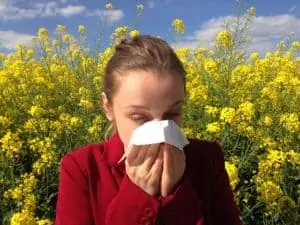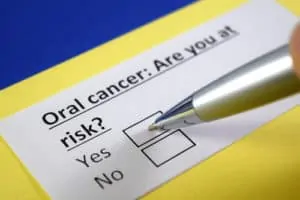Overall Health

Choose the Right Brush
The right toothbrush for you depends on a few factors, including the size of your mouth. Toothbrushes come with various sized heads, so if you have a smaller mouth, choose a brush with smaller brush head. Also make sure the bristles are labeled as soft. Using bristles that are too tough can damage enamel and create problems.
Use Proper Technique
It doesn’t take a lot of elbow grease to thoroughly clean plaque and bacteria off of teeth. In fact, scrubbing too hard can damage teeth. Instead of using a back and forth motion, try to focus in brushing in soft, gentle circles. Don’t forget to hold the toothbrush at a 45 degree angle to get up under the gum line, too.
Replace When Necessary
If your bristles have begun to fray, it’s time to get a new toothbrush. It’s actually overdue for a replacement. When the bristles are nice and tightly fit together they can more easily get in between teeth and under the gums. When they separate, you won’t get as good of a clean.
Commit to Twice a Day
Your dentist in Sparks and the American Dental Association recommend brushing for two minutes, twice day, every day. A thorough cleaning in the morning helps remove plaque and bacteria that have built up overnight, and another two minutes before bed removes food particles and even more bacteria. Not brushing as often as you should may lead to gum disease, which not only affects your oral health, but overall health as well.
Gum Disease & Overall Health
Gum disease is caused by a buildup of bacteria under the gum line. If left untreated it can cause tooth loss and other whole-body concerns including:
- Heart Disease
- Respiratory Problems
- Diabetic Complications
Following the two minute, twice a day guideline and using the right technique goes a long way in keeping your smile in its best shape. But it’s more important than that. Proper oral hygiene can reduce the risk of gum disease and help protect your entire body.
Besides a great at-home routine, maintaining appointments at our Sparks dental office bi-annually will do even more for your health. These regular visits provide a deeper cleaning and remove even more plaque and bacteria buildup. They also give us a way to monitor your oral health for any potential problems so we can treat them early.
If you’re overdue for a dental cleaning, we welcome you to schedule an appointment with us today.

Itchy, Stuffy, and Drippy
Most of us are well aware of the unpleasant symptoms of an allergy flare up. The itchy, watery eyes, the neverending nasal drip, and the sinus stuffiness are all common side effects. And while they’re certainly annoying, they can also affect more than you may think. When your body comes in contact with an allergen, it responds by producing more mucus than normal. This mucus is gross, thick, slimy stuff that blocks airways and sinuses and makes it hard or impossible to breathe out of the nose. Instead, our bodies automatically adapt to breathe from the mouth. This mouth breathing is what’s concerning to your dentist in Sparks.
Why Mouth Breathing is Concerning
Mouth breathing is a bigger problem than it may initially appear. In fact, a study conducted by the Academy of General Dentistry reported that mouth breathing can affect oral health in a variety of ways. Too much mouth breathing as a child can cause a gummy smile or even problems with facial development. And the problems don’t go away in adults either. Mouth breathing has been linked to overall oral health issues, mostly because it causes dry mouth.
Dry Mouth & Oral Health
Dry mouth is an incredibly common complaint in many dental patients, and while it’s certainly uncomfortable, it’s also dangerous. Dry mouth essentially means that saliva production has decreased. And this is a problem. Saliva is responsible for rinsing away bacteria and neutralizing acids in the mouth that attack tooth enamel and lead to decay. Without saliva, teeth are constantly exposed. But that’s not all. Dry mouth can also cause chronic bad breath and is one of the causes of gum disease. Gum disease, if left untreated, can begin to affect the rest of the body and increases the risk of stroke, heart disease, and heart attacks.
The Problem with Allergy Medicine
To get relief from allergy symptoms, we usually turn to our trusted antihistamine. However, while this medicine may indeed ease itchy eyes or decongest sinuses, they may also make dry mouth worse. To help protect yourself and get the allergy relief you want, try:
- Chewing sugar-free gum
- Using lubricating mouthwash
- Drinking water
- Sleeping with a humidifier in your bedroom
Never stop any medication recommended by your doctor without first talking about it.
If you’re concerned that your allergies or allergy medication is causing dry mouth and putting your oral health at risk, we welcome you to call our Sparks dental office to schedule an appointment. We’re here to help keep our neighbors’ smiles healthy and can help you find relief.

Know The Risks
It’s important to note that anyone can develop oral cancer whether they have or engage in factors that increase their risk or not. Some of the risks are unavoidable, but many can be controlled through making smart lifestyle choices. Some factors that increase the risk of oral cancer include:
- Tobacco Use: Smoking cigarettes, cigars, or using smokeless tobacco greatly increases your risk of oral cancer. Statistics show that 80% of oral cancer diagnoses are in tobacco users.
- Drinking Alcohol: Consuming alcohol regularly can also put you at greater risk. Nearly 70% of those diagnosed with oral cancer are heavy drinkers.
- Drinking & Smoking: Since both tobacco use and drinking large amounts of alcohol increases the likelihood of getting oral cancer, if you do both, your chance for oral cancer can be as high as 100%.
- Gender: Men are two times more likely to develop oral cancer than women. While this risk factor can’t be changed, men can reduce their risk by not drinking or smoking.
- Age: Our chances of getting oral cancer increases as we age. The average age of diagnosis is 62, and the majority of oral cancer patients are at least 55.
- UV Rays: Skin cancer isn’t the only thing that can happen from too much unprotected sun exposure. Oral cancer is also higher in those who spend a lot of time in the sun without wearing sunscreen.
Recognize The Symptoms
Being able to identify the signs and symptoms of oral cancer early increases the chance of survival. Oral cancer treatment is often successful in the earlier stages, so the sooner you see your dentist in Sparks if you suspect anything, the better. The most common signs include:
- Chronic bad breath
- Sores that won’t heal
- A lump on the cheek
- Difficulty swallowing
- Changes in your voice
During your regular dental cleanings and exams, your hygienist and dentist will monitor your mouth for any abnormalities and can use high-tech equipment that can show what the human eye can’t see. This is just another reason maintaining your bi-annual dental appointments is so important to your overall health.
If it’s been longer than six months since your last visit, call our dental office in Sparks to schedule an appointment today. You never know, one visit could save your life.

Feelings of Anxiety or Helplessness
The most widely accepted interpretation of dreams where your teeth fall out revolve around feeling anxious or helpless. Occasionally, the dreams only happen during when you’re life is a bit too stressful. Other times, however, the dreams are recurring and happen regularly. According to a Psychological Reports study, repeatedly experiencing dreams in which you lose your teeth may be more common in those in those whose personality contains high levels of anxiety, those who are depressed, and those who struggle with self-esteem issues.
An Impending Serious Decision
In life, there are times when we need to make difficult decisions that can affect everything. Perhaps you’re considering quitting your job, but are nervous about how that decision will affect your family. Maybe you’re unhappy in a relationship and are questioning how that decision will change your life as you know it. When these stressful decisions need to be made, it can make us feel as if we don’t have any control over our own lives. During these events we’re more likely to experience tooth loss dreams.
A Positive Rebirth
Not all of the common dream interpretations are attributed to something so worrisome. In fact, according to research conducted by psychologist Carl Jung, dreaming about your teeth falling out can be a sign of rebirth. Whether you’re starting a new, exciting job, finally getting serious about that hobby you’ve always wanted to try, or embarking in a new relationship, there are many life events that can be fulfilling and positive. But they are still changes and sometimes our unconscious mind constructs that in a subconscious dream. In this case, a dream where you lose your teeth.
If you suffer from dreams about your teeth falling out, try not to worry about your real-life teeth. There’s no studied evidence that suggests the two are linked together. In fact, most dreams are not accurate representations of what will happen in real life, but rather symbols of how our psyche reacts to life’s situations.
However, if you are missing a tooth or are at risk for losing one or several, we welcome you to talk to us about some tooth replacement options including dental implants, a dental bridge, and dentures. Call our Sparks dental office to schedule a consultation today!

Gum Disease
Gum disease is a serious infection that requires a proper diagnosis and early intervention to treat. It’s typically caused by a buildup of plaque that’s not removed through proper brushing and flossing at home. When left on the teeth too long, this plaque builds and transforms into hard tartar. This tartar is impossible to remove on your own and requires a professional dental cleaning. However, if the tartar is not removed, the bacteria within it can move into the gum tissue and cause an infection. This infection can easily progress into gingivitis or periodontitis and may cause tooth loss. But the worries don’t stop in your mouth. In fact, research shows that gum disease has been linked to heart disease.
Heart Disease
Untreated gum disease leaves the infection free to do whatever it wants, including traveling into other areas such as the bloodstream. If this happens, your body responds by producing too much C-reactive protein (CRP). Higher than normal levels of CRP can lead to serious conditions such as:
- Inflamed arteries
- Blood clots
- Heart attacks
- Strokes
Recognize the Signs of Gum Disease
Diagnosing gum disease and beginning treatment is key to protecting your mouth and your overall health. To do that, you need to be able to recognize the common signs of gum disease including:
- Bleeding when brushing or flossing
- Puffy, tender gums
- Bad breath
- Loose teeth
If you notice any of the signs of gum disease, call your dentist in Sparks to schedule an appointment.
Besides brushing and flossing every day at home, the best way you can avoid gum disease and protect your heart is to maintain regular dental visits at least twice a year. These appointments can go a long way in keeping you healthy. If it’s time for your bi-annual dental cleaning, give our Sparks dental office a call today.

- Wash Your Hands Often
Using warm water and soap, scrub your hands before preparing food, after eating or using the restroom, and after shaking hands. If soap and water are unavailable use an alcohol-based sanitizer.
- Keep Your Hands Away From Your Face
Germs spread easily through the eyes, nose, and mouth. If your hands get in contact with flu germs and you rub your eye, itch your nose, or bite your fingernail, it’s almost a guarantee that you’ll get sick.
- Drink Plenty of Water
Your body functions optimally if it’s hydrated. This includes its ability to fight off germs. Not to mention, a well hydrated mouth is a healthy mouth, and that’s sure to make your dentist in Sparks happy.
- Eat a Well Balanced Diet
Fueling your body with fruits, veggies, whole grains, and proteins is crucial in helping your body stay healthy. Proteins, in fact, have been proven to support the immune system so make sure you’re getting your fair share.
- Clean Your Home and Your Office
Sanitize the areas you or others use most. Think about the items that get touched often like doorknobs, toilets, elevator buttons, or your computer mouse. A good rule of thumb to follow is to clean it even it doesn’t look dirty.
- Take Care of Your Toothbrush
Toothbrushes can hold a lot of bacteria and if not taken care of properly could make you sick. Make sure you rinse the bristles thoroughly after each use, store family members’ brushes far away from each other, and consider sterilizing them once a week in hot water.
- Avoid People Who Are Sick
Although this seems obvious, it’s not always simple. If a co-worker comes to the office sniffling and sneezing, it’s difficult to avoid them and everything they touch. Try to communicate via email instead of face-to-face meetings, carry alcohol-based hand sanitizer with you, and again, always wash your hands and avoid touching your face.
If you do happen to get sick, try your best to stay home to help prevent the illness from spreading to others. Our dental office in Sparks also encourages you to find sugar-free medications so as you’re working on feeling better, you’re not doing damage to your oral health.

What Are Probiotics?
Talks about probiotics have been increasingly popular throughout the past couple of years. But what are probiotics and why are they good for you? Simply, probiotics are live microorganisms that help support our bodies. These microorganisms are usually bacteria, but not the bad bacteria that we normally think about and that make us sick. The bacteria we refer to when talking about probiotics are the good bacteria that help us stay healthy.
Different Probiotics Treat Different Things
You may remember some yogurt companies in particular mentioning probiotics in their advertisements. These probiotics specifically help with digestion and support gut health by keeping enough good bacteria around to fight off the bad bacteria off. There are other types of probiotics around that tend to help different areas of the body. In this case, we’re referring to oral probiotics.
Oral probiotics are ones that are being researched to study their effects on oral health. And there may be some exciting news in the future. Initial studies support the idea that there may be a positive correlation between specific types of probiotics and reducing the risk of gum disease, plaque, and bad breath.
Let’s Talk About Bifidobacterium & Lactobacillus
Don’t worry about how to pronounce them, let’s just focus on why we’re taking a closer look at them. Bifidobacterium and Lactobacillus are strains of probiotics and are the two that are mainly used in probiotic research in relation to oral health. Found naturally in both the bodies and mouths of mammals, Bifidobacterium and Lactobacillus have been studied closely to see if there was a connection between increasing the amount of them in test subjects and healthier mouths. While the amount of research we currently have is limited, and the evidence is not yet conclusive, there have been cases where Bifidobacterium and Lactobacillus have helped in the treatment of periodontal disease and halitosis, and has seemed to reduce the risk of cavities.
This is exciting news for the dental community. But while we’re waiting on researchers to continue studying the possible connection, we don’t recommend simply starting yourself on a probiotics routine before discussing it with your medical team, including your dentist in Sparks.

Top Culprits
We don’t want to discourage anyone from exercising or create fear that working out will ultimately lead to dental problems. While there seems to be a correlation between athletes and tooth decay, we can pinpoint two reasons why.
Sports Drinks
Sports drinks are packed with ingredients that can help the body replenish what’s lost during intense exercise. However, some of those ingredients are known contributors of enamel erosion and tooth decay. For example, the acidity alone can quickly cause damage. In fact, according to an article published by the Academy of General Dentistry, tooth damage can occur after just five days of consuming sports drinks because they’re so acidic.
Mouth Breathing
During any exercise, trainers and coaches alike will encourage you to practice proper breathing techniques to help reduce the risk of cramps and to make your workout as effective as possible. However, the majority of people breathe in and out of their mouths during exercise. Mouth breathing dries the mouth out and makes it an ideal place for damaging bacteria to thrive.
It’s Not All Bad News
Just because high intensity exercise over a prolonged period of time may lead to issues with your oral health, doesn’t mean you should quit your workout routine. According to research collected through the Third National Health and Nutrition Examination Survey (NHANES III), individuals who followed the government’s recommendations for physical activity were less likely to have gum disease. And that’s great news for both your mouth and your body. Gum disease can affect overall health and has been linked to serious health issues including increased risk for certain cancers, heart disease, and stroke.
Whether you’re concerned about exercise affecting your oral health or even if you’re just looking for a dentist, we welcome you to call our Sparks dental office to schedule an appointment. We’re always happy to see our neighbors and keep them healthy.

What to Look For
Bumps, cracks, discolorations, lines, even “hairs” – these are all things you’ll want to keep a keen eye on when you stick out your tongue and take a look. Make it a habit of checking out your tongue every day when you brush your teeth. Take a moment, open up, and say “ahh.” If you notice any unusual symptoms that seem to persist for more than two weeks, it’s a good idea to give your dentist in Sparks a call.
What Does Your Tongue Look Like?
If your tongue is healthy it will be covered with small papillae or nodules and be a nice healthy shade of pink. If you see something out of the ordinary or have pain, it may indicate a problem. Here are some things to be on the lookout for:
1) A Sore Bumpy Tongue
Oral Cancer – If you ever have a lump or bump on your tongue that persists for more than two weeks, it’s important to have it checked out as it could be an early sign of oral cancer. Oftentimes, oral cancer doesn’t cause pain in its most earliest stages.
Smoking, Canker Sores, Trauma – All of these things can also cause irritation to your tongue. If you’re experiencing pain, call your doctor.
2) Redness
Vitamin Deficiency – You might need more B12 or folic acid if there’s an intense redness to your tongue.
Geographic Tongue – This is usually characterized by redness and patches with white borders around them and generally harmless.
Scarlet Fever – A bright red appearance with bumps could indicate scarlet fever. It’s important to treat this condition with antibiotics.
3) White Coating or White Spots
Leukoplakia – This condition causes cells on the tongue to grow at an extremely rapid pace. We usually see this occur when someone uses tobacco products and can be a warning sign for cancer. However, it is generally not harmful. If you think you’re experiencing leukoplakia, it’s best to give us a call!
Oral Thrush – A harmless yeast infection is to blame for this type of thick, white coating on the tongue. It’s very common in infants, denture wearers, and people with diabetes.
These are just a few of the most common signs your tongue may be giving you about your health. It’s just as important to use common sense and call my Sparks dental office if you suspect something is not right. When your tongue and teeth are healthy, the rest of you will be too!

Risks to Overall Health
Your nails are one of the areas on your body where you can find tons of germs and bacteria. Usually wedged in between the nail and the skin of your finger, these germs and bacteria can be pretty harmful if ingested into your system. When someone puts their finger in their mouth and bites away at the nail, it’s an easy way for these bacteria to be released into the body which could lead to some serious illnesses.
Negative Effects on Oral Health
Besides the risk to overall health, nail biting can wreak havoc on teeth and gums. Your dentist in Sparks will tell you that chronic nail biting has been linked several oral health issues including chipped, cracked, or worn down teeth, damage to the gum tissue, and bruxism. Bruxism, more commonly known as tooth grinding, can lead to headaches, recessed gums, tooth sensitivity, and even tooth loss.
Tips on How to Stop
Like any habit, stopping nail biting can be difficult, but it’s not impossible. Trying to retrain yourself to quit nibbling on your nails takes a conscious effort. These tips can help.
- Paint your nails with an ill-tasting lacquer designed specifically for nail biters
- Find another release for stress like meditation, yoga, deep breathing, or exercise
- Check out close up photos of the bacteria that live under nails to remind you of what you could be putting in your mouth whenever you bite — spoiler alert: it’s gross!
- Keep nails trimmed as short as possible to give yourself less to bite
Start by trying one of the above methods to quit biting your nails. If it doesn’t work for you, try another one. It may take persistence but once you quit biting your nails, your overall health and oral health will thank you.
In the meantime, if you happen to chip or crack a tooth, have gum damage, or suspect bruxism we welcome you to schedule an appointment at our Sparks dental office. We’ll diagnose the damage and talk with you about the most appropriate treatment for you.
